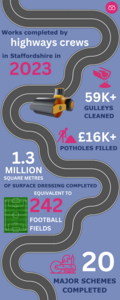Staffordshire County Council Highways Investment, Digital Switchover Scams
Written by Hitmix Local News on 30 December 2023
Staffordshire County Council is making good on its investment in highways across the county, after completing eight major resurfacing schemes this financial year.
After announcing an investment of £30 million into maintaining and improving the county’s highways over the next two years back in 2023, crews have been hard at work making that investment a reality for local residents.
Resurfacing schemes completed so far this financial year include a £200,000 scheme on the A34 Liverpool Road in Newcastle, among many others.
Added to this, an extensive programme of repair has seen more than 16,000 pothole repair jobs completed across the county, and more than 1.3 million square metres of surface dressing completed—the equivalent to 169 miles of highway – plus more than 59,000 gullies were cleaned across the county. More improvements are planned in the New Year, including the A34 Talke Road in Bradwell.

_________________________________________________
People in Staffordshire are being reminded to be on the lookout for potential scams, as criminals look to exploit the forthcoming analogue to digital switchover.
Staffordshire County Council, wants people to be aware of the switchover and what it means for them, but not to be tricked into giving out any personal information.
The switch from the old analogue system to the new digital service is expected to be complete by December 2025. Communication providers are working with Ofcom, the government and charities to make the switch as easy as possible.
The authority’s Trading Standards service have already had reports of scammers telling older and more vulnerable people, including users of healthcare devices, that they would be disconnected unless they hand over their personal details, including bank details. Like other common scams, criminals are using emails, text messages and telephone calls to get people’s details.








